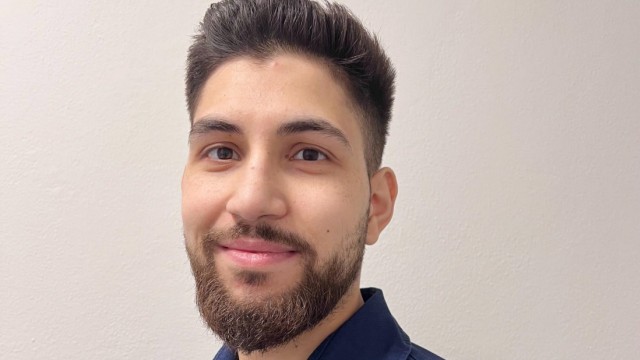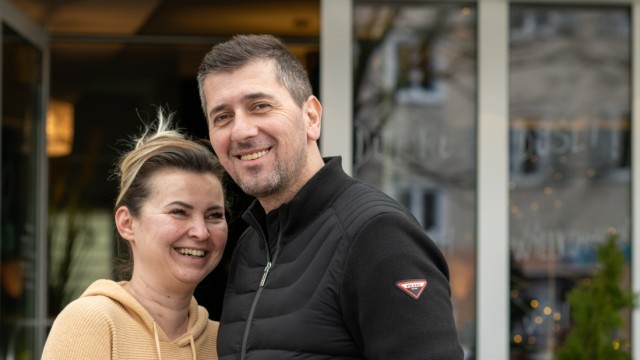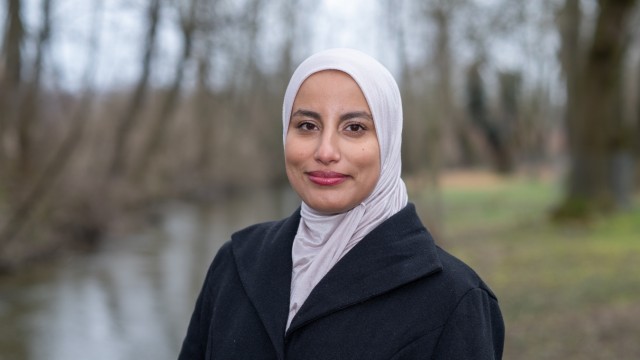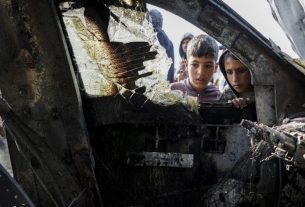Some companies have prayer rooms
Inas Ali Zeidan from Garching is responsible for recruitment.
(Photo: Catherine Hess)
“Ramadan is the time to reset everything,” says Inas Ali Zeidan. The 39-year-old is a recruiter for the automotive industry. “The first few days are difficult until you recover. But it’s a precious time. You take a step back mentally and physically and focus entirely on God and lead a good life,” he says. Fasting for 30 days is “quite sporty”, but evenings with family and friends are even more precious.
He would like Ramadan to become more visible in German society. “There are 5.6 million Muslims in this country and about half of them fast, so it would be nice if we didn’t have to explain ourselves every year,” he says. As a human resources manager, he observes how companies treat their Muslim employees. There are big differences. “Some more diverse companies have already set up prayer rooms and officially wish their employees a Happy Ramadan, just as they wish a Merry Christmas or a Happy Easter at other times of the year.” This is diversity in practice and promotes unity.
In times of shortage of skilled workers, such initiatives are becoming increasingly important. But there are also other companies that continue to require Muslim employees to have lunch together during the fasting month. “More flexibility would be really helpful. And therapeutic fasting is in vogue, which also offers something to talk about across cultural or religious boundaries.”
Purify the heart

Mohamed Hamse Iriksous of the Muslim Council of Munich is pleased that even friends who do not pray or come to the mosque are participating in the month of fasting.
(Photo: private)
Mohamed Hamse Iriksous is a political scientist, taxi driver, imam of the Al-Ahibba mosque in Munich and a member of the Muslim Council of Munich. The month of fasting, he says, is an opportunity “to refresh your connection with God.” It’s about regaining control over your lifestyle, which may have weakened a bit over the course of the year. In any case we must do good, donate to those in need, “purify the heart: Christianity and Judaism also know this”.
The 31-year-old, born in Kiel, says he has felt close to the faith since childhood. His father is half Syrian and half German and his mother is Syrian. However, he says, there was a moment in the current imam’s life when his relationship with God was disturbed: when he was diagnosed with a chronic illness. “But ultimately it is these harsh trials of life that bring you closer to faith again.” Fasting is good for him. Almost all of his Muslim friends have fasted, he says, “even those who don’t pray or go to the mosque.” He also has friends who drink alcohol at the disco in the evening if they feel like it. “But then they take part in Ramadan because it is a very important ritual for Muslims.”
For some the religious aspect is more important, for others the cultural aspect is more important. “In Muslim countries, special series are released for Ramadan, which the whole family then watches together in the evening.”
Colleagues take each other into consideration

Almir Burnić leads a team of 30 nurses at the Münchenstift.
(Photo: Catherine Hess)
Almir Burnić tries to avoid eating and drinking during the day. “I’m more with myself these days,” he says. The 28-year-old nurse came to Munich from Bosnia nine years ago to train and works as a residential area manager in the St. Maria retirement and nursing home in the Münchenstift. She leads a team of 30 people. She estimates that at least half of her employees come from the former Yugoslavia, while others come from Tunisia, West Africa or other parts of the world. Among them there are many Muslims: “some fast for the whole month, others have a more relaxed approach and fast only for ten days, others still not at all”, she says.
During Ramadan he tries to take into account the needs of people who are fasting, for example when defining the duty shift. It’s not that easy, “but you just need one talent and it usually works.” Then he gives people who are fasting less physically strenuous activities or takes the fasting period into account when organizing shifts. “We prefer to provide night or late shifts for Muslims during Ramadan, but we shouldn’t try too hard either, because fasting must be experienced consciously.” Since everyone knows each other well, this is usually not a problem. “There is great mutual respect in our team,” he says, which is why non-Muslim colleagues are willing to take on a shift during Ramadan for someone who is fasting. It’s almost like being in a family.
And at the end of the month, when the Sugar Festival is celebrated in all parts of the world, the Münchenstift canteen also celebrates: lamb stew, fish, baklava and other desserts.
Break the fast with dates

Narcis and Melita Hrnjica in front of their restaurant in Sendling, where they offer a Ramadan menu.
(Photo: Catherine Hess)
The owners of the River Restaurant in Sendling offer a Ramadan menu every year. The first breaking of the fast begins on Monday at 6.29pm, at sunset. First everyone receives a date, it is tradition, “because the prophet did so and because they say that dates have a purifying effect on the body”, explains Melita Hrnjica. Then there is a soup to warm the stomach and then traditional Bosnian dishes such as stuffed peppers, cabbage rolls or ražnjići. “You absolutely need to book because the restaurant is particularly busy these days.”
There are families with children, young people who meet to break the fast, but also single men who want to eat something substantial after the evening fast. “During Ramadan, when everyone sits together after sunset, the atmosphere is always particularly beautiful and peaceful. This creates a special intimacy.” So that the host couple also gets something out of the evening, friends and family help in the cooking and serving. This time is also special for children. “Our children grow up open to the world, through nursery and school they learn about Christmas and Easter, and then there is Ramadan”. Children don’t fast yet, only after puberty. “Then we will let them decide whether they want to fast or not.”
Parents go without food and drink during the day – not so easy when you also work in the restaurant industry. But the body adapts and in the end it’s a question of the head, says Melita Hrnjica. “I think of so many people in the world who have nothing and how well we are doing here. My husband and I lived through the war in Bosnia in the 90s, we are refugee children. We are grateful for what we have today. During Lent we appreciate even more so the fact of having something hot on the table every day.”




